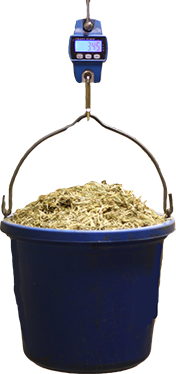Feed Complement

Fiber Supplement

Hay Replacement
Feed Complement
Mixing Lucerne Farms forage at a 3:1 ratio with grain can help increase digestibility and performance of grain and supplements, making sure your horse’s digestive process gets off to a running start.
What You Should Know
Saliva Production
Did you know saliva production is directly correlated to your horse’s jaw movement? This means the more jaw movement, or chew time, your horse has, the more saliva your horse produces.
Why is this important? This essential element does more than just moisten the feed to ease the passage from the mouth to the stomach, protect vital amino acids from the gastric acid in the stomach and aid in the digestion of carbohydrates. It also is the horse’s natural buffer against the formation of ulcers.
How does Lucerne Farms Forage help? Feeding grains and supplements alone cuts a horses chew time significantly, reducing the protective and vital saliva. By adding Lucerne Farms forage into your grain bucket with your feed, you’re more than doubling your horse’s jaw movement, improving the quantity and the quality of their chewing.
Longer Chew Time – Less Hunger
Did you know a horse never stops producing stomach acid? Unlike humans, horses evolved grazing almost constantly and with this, their stomachs product stomach acid around the clock.
Why is this important? The longer a horse goes without food in their stomach, the more likely their chances are for developing ulcers and other unwanted behaviors that are thought to help ease the pain of an empty stomach.
How does Lucerne Forage help? Because horses chew forage up to four times longer than grain, mixing Lucerne Farms forage in with grains and supplements will help slow your horse down. This increases the amount of time your horse has food in front of them during the day and reduces the amount of time your horse spends hungry. This means happier horses, less unwanted behaviors and vet visits.
Fewer Dental Issues
Did you know that horses change the way they chew depending on the form of their feed? There are a lot of movements involved in a horse’s chew and these movements change depending on what they are eating.
Why is this important? When horses are chewing grain for example, the sweep of their jaw is shortened and doesn’t fully grind the outside of their teeth, which can lead to uneven tooth wear and dental issues.
How does Lucerne Farms help? Horses chewing forage have a more extended chew, which is why pasture-fed horses have fewer dental problems. Because of the length of our chopped forage, horses chew with a more natural sweep of their jaw, helping to keep teeth more even.
Do You Weigh Your Hay?
Always calculate your horse’s feed by weight, not volume.
Lucerne Farms’ forage can be fed in a bucket, in a corner feeder mixed with the daily grain ration, or even outside in a feed tub.
When feeding Lucerne Farms’ forage feeds, you determine the proper amount according to the horse’s age, weight, temperament, and workload.
Always make changes to your horse’s diet gradually over a period of 7 to 10 days. Consult a veterinarian or equine nutritionist concerning your horse’s specific needs.

